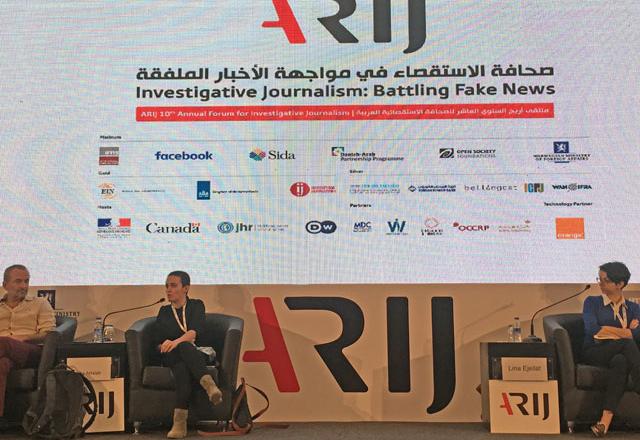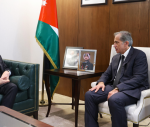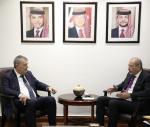You are here
‘Who did not die from bullets, died of hunger’
By Rana Husseini - Dec 02,2018 - Last updated at Dec 02,2018
DEAD SEA — Journalists, many of whom worked in conflict zones, shared their experience with over 400 participants of an investigative reporting forum held at the Dead Sea over the weekend.
The participants of a panel titled, “Life on the Edge” were part of the 11th Annual Forum for Arab Reporters for Investigative Journalism (ARIJ) held at the Dead Sea Convention Centre on Friday.
The panel was designed to tackle the dangers that journalists face on a daily basis, including being murdered, tortured, abducted, harassed and threatened.
“Targeting journalists only makes our mission of going after the truth more and more important,” CEO and founder of Stream Media Consultancy, Rawan Aldamen, told the gathering.
Senior ARIJ trainer in Yemen, Khaled Haroji, highlighted the “collective punishments his colleagues had suffered from for the past four years”.
“My colleagues have faced all kinds of accusations of treason and of being Western agents from all parties in Yemen,” Haroji said.
He also spoke of the tough conditions journalists face, stating “who did not die from bullets, died of hunger, since my colleagues have not been paid salaries for the past two years, when the Houthis entered Sanaa in 2014”.
Syrian reporter Lina Shawaf addressed the problem of “never-ending oppression and the targeting of journalists in Syria”.
Egyptian journalist Lina Attalah, who is the co-founder and chief editor of Mada Masr, painted a bleak picture of press freedom in her country.
Among the methods adopted by the Egyptian authorities, according to Attallah, were the introduction of laws “that control media freedoms such as the cybercrimes law and the media regulation law”.
“We also have dozens of journalists who are imprisoned in what is termed administrative detention, and no one knows when they will be released,” Attallah said.
Rana Sabbagh, the executive director of ARIJ, said the situation of press freedoms in the Arab world was “becoming worse and worse every year”.
“These years have also been the most difficult in the life of ARIJ, as governments continue introducing ominous new measures to withhold information, to censor or force media into self-censorship, to threaten, to imprison and now even to kill,” Sabbagh stressed.
Related Articles
AMMAN — The ninth annual forum for Arab Investigative journalists is scheduled to be held at Dead Sea next month, the organisers said on Wed
DEAD SEA — Over 475 participants from the Arab world gathered at the Dead Sea on Friday for the opening of the 10th Annual Forum for Arab Re
Rana Sabbagh, the executive director of Arab Reporters for Investigative Journalism (ARIJ), has won a seat on the first board of directors of the Global Investigative Journalism Network (GIJN) with the highest total votes.

















